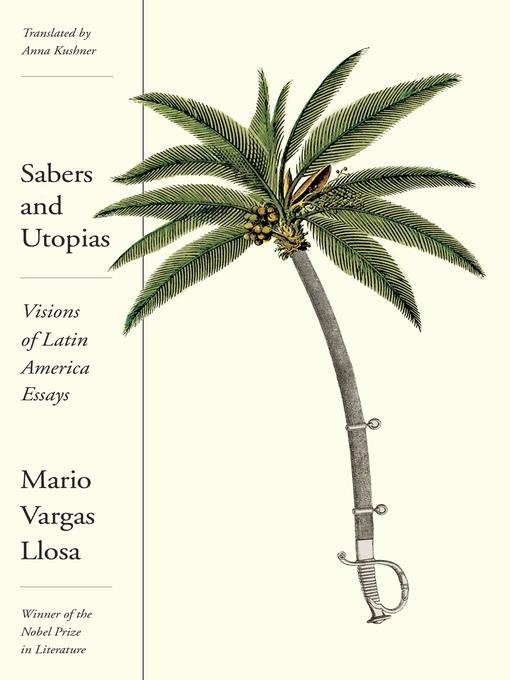
Sabers and Utopias
Visions of Latin America: Essays
کتاب های مرتبط
- اطلاعات
- نقد و بررسی
- دیدگاه کاربران
نقد و بررسی

December 4, 2017
Written between 1979 and 2014, these 38 penetrating essays by Pulitzer-winning novelist Vargas Llosa (The Discreet Hero) shine a light on the social and political realities of contemporary Latin America. Although most are focused on historical moments specific to the countries covered—the fall of dictator Anastazio Somoza in Nicaragua, the sentencing of dictator Alberto Fujimori for human-rights crimes in the author’s native Peru, the injustices of Fidel Castro’s Cuban Revolution, president Felipe Calderón’s war against narco-trafficking in Mexico—they are united by recurring themes: rejection of authoritarianism, championing of the free press, and disdain for nationalism (which Vargas Llosa refers to as “the culture of the uneducated”). The author’s opinions are informed by his staunch humanism, expressed most passionately in “Hunting Gays,” his caustic denunciation of the cultural promotion of homophobia, as well as by his formidable sense of historical perspective, seen to best advantage in “Dreams and Reality in Latin America,” in which he describes “the empire of myth and fiction” that the Americas historically served as for their European discoverers. The otherwise politically minded collection concludes with a short section celebrating the literature of Latin America. As this book eloquently reminds readers, Vargas Llosa himself is an important part of the region’s literary canon.

December 15, 2017
Essays on Latin American politics reflect 5 tumultuous decades.Nobel Prize winner Vargas Llosa (Notes on the Death of Culture: Essays on Spectacle and Society, 2015, etc.), born in Peru in 1936 and who ran for president of his home country in 1990, reflects on the politics and culture of Latin America in essays written over more than 50 years. Translated by Kushner and selected and introduced by Carlos Granes, a Colombian-born social anthropologist and scholar of Vargas Llosa, the essays reveal the trajectory of the author's views from a leftist supporter of Fidel Castro to a conservative critic of various "collectivist ideologies" that he sees as having blighted Latin America. Granes groups the essays into five sections that are thematically related but not presented chronologically. In an informative foreword, he contextualizes the author's work as responses to political events that occurred from the Cuban revolution of the 1950s, which Vargas Llosa considered "a model within socialism," to the current upheaval in "impoverished, damaged Venezuela, devastated by demagoguery and corruption" under the presidency of Nicolas Maduro. Castro's regime lost Vargas Llosa's respect in 1971 when the Cuban ruler imprisoned the poet Heberto Padilla for "counterrevolutionary criticism" expressed in his poems. In response to Padilla's public humiliation--he was forced to engage in self-criticism--Vargas Llosa, along with dozens of other writers, sent a strident rebuke to Castro, communicating "shame and anger" over his repression of freedom and abuse of human dignity. Many essays argue for intellectual openness: "the way in which a country strengthens and develops its culture," the author wrote in 1981, "is by opening its doors and windows, widely, to all intellectual, scientific, and artistic currents, stimulating the free circulation of ideas." Headnotes would have been a welcome addition to the collection; although Granes dates each piece, there is no indication of where they appeared or for what occasion. An exception is a warm memoir of literary friendships delivered at the first "Canon of the Boom" Congress in Madrid in 2012.Insightful essays express guarded hope for Latin America's future.
COPYRIGHT(2017) Kirkus Reviews, ALL RIGHTS RESERVED.

January 1, 2018
The internationally acclaimed author of more than two-dozen works of fiction and nonfiction, Vargas Llosa is equally recognized for his active political career. When he ran for president of his native Peru in 1990, he campaigned on a platform that embraced globalization, seeking to mimic the successes of countries like Taiwan, South Korea, and Singapore. Though he lost the election to Alberto Fujimori (who later enacted authoritarian rule), Vargas Llosa's unwavering devotion to the ideals of individual freedoms, private property, and neoliberal democracy defines every entry in this collection of reported essays and opinion pieces that covers the nearly four decades between 1979 and 2014. Writing from all over the world, the Nobel laureate excoriates Latin American dictators like Nicaragua's Somoza and Chile's Pinochet, lashes out against attacks on the free press, and delves into the best years of Latin American Boom writing, commenting on his contemporaries Julio Cortazar and Jorge Luis Borges. After nearly a half century of literary output, Vargas Llosa still has few equals when it comes to power of expression and clearheaded conviction.(Reprinted with permission of Booklist, copyright 2018, American Library Association.)

September 15, 2017
Nobel Laureate Vargas Llosa doesn't do just fiction (see "Fiction Picks"). In this collection, featuring never-before-translated essays, he takes a levelheaded look at Latin America, tracks his embrace and rejection of revolution, and blasts nationalism, populism, indigenism, and corruption.
Copyright 2017 Library Journal, LLC Used with permission.

























دیدگاه کاربران